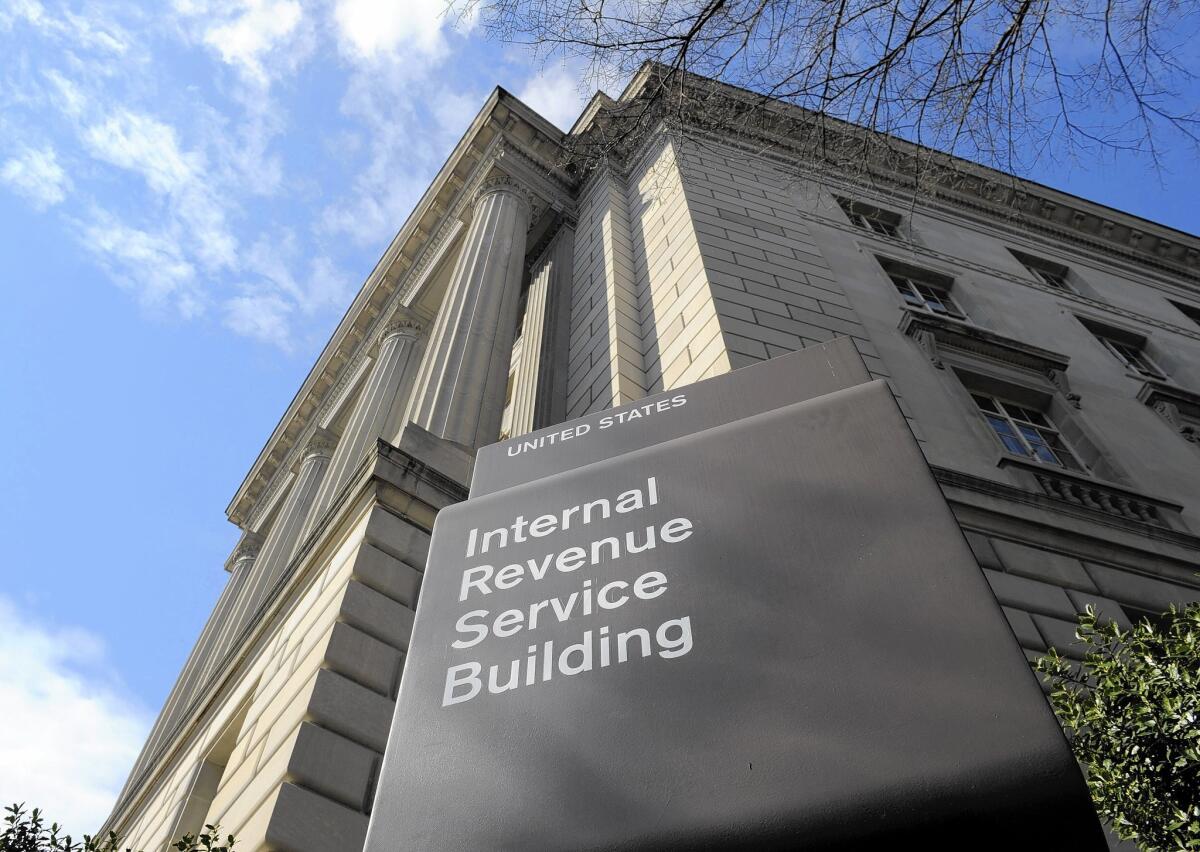Calculating your estimated quarterly taxes

The IRS requires you to figure your estimated quarterly taxes, not your “guesstimated” taxes. Above, the IRS building in Washington.
- Share via
Dear Liz: I recently retired and started my own consulting business, which is doing very well. My question is on taxes. I have been told that I must pay quarterly taxes, but I have no idea if I will make $10 this month or $10,000. How do I estimate my income if I have no idea? Can I just wait till the end of the year and figure it out then?
Answer: You don’t want to do that. If you owe a significant amount at the end of the year, you’ll owe a substantial penalty on top of your tax bill.
The good news: The IRS requires you to figure your estimated quarterly taxes, not your “guesstimated” taxes. You’ll make the calculations based on what you actually earned that quarter, not what you expect to earn in the upcoming quarter.
Tax software programs such as TurboTax and TaxAct can help you make the calculations, but you’d be smart to hire a tax pro with experience advising small-business owners. The pro will have ideas about how to minimize and manage your tax bill. He or she also will be available to answer the many questions you’ll have about taxes, incorporation and other matters as your business grows. If you should be audited, a tax professional such as an enrolled agent or a certified public accountant would be able to represent you. (Even the most avid do-it-yourselfer should understand that representing yourself in an audit is not a good idea.)
You can get referrals from the National Assn. of Enrolled Agents at https://www.naea.org and the American Institute of CPAs at https://www.aicpa.org.
Social Security spousal benefits
Dear Liz: A friend of mine has told me that he thinks that I can apply for spousal benefits at my full retirement age and hold off getting my Social Security under my own work record until I am 70. Here is the scenario: My husband is 77 and has been collecting Social Security since he was 62. He continues to work. I will be 66 in November and I am still working. I plan to take Social Security at age 70. Can I apply for spousal benefits and receive an amount equal to half of what my husband receives from the age of 66 until I turn 70 and then apply under my own account at age 70 and receive my maximum benefit at that age? My friend feels strongly that this can be done, but I called Social Security and explained it clearly (or at least I thought I did) to them and they said that this could not be done. Then I went into the Social Security website and looked under “Spousal Benefits,” but the wording did not clearly say that this couldn’t be done.
Answer: What you’re describing is the “claim now, claim more later” strategy that can boost a couple’s lifetime Social Security by tens of thousands of dollars. It’s one of the approaches outlined in AARP’s excellent primer, “How to Maximize Your Social Security Benefits,” which you’ll find on its site, https://www.aarp.org, along with a calculator to help you understand how different claiming strategies could affect what you get.
These strategies capitalize on the fact that delaying the start of Social Security benefits results in substantially larger checks for life. In the case of two-earner couples, the “claim now, claim more later” strategy allows one spouse the option of getting checks (the spousal benefit) for a few years while allowing her own benefit to grow to its maximum.
As long as you wait until your own full retirement age to apply for spousal benefits, and your spouse is already receiving benefits, then you should be allowed to switch to your own benefit when it maxes out at age 70. If your spouse weren’t receiving benefits yet, but had reached his full retirement age, he could file for benefits and immediately suspend his application (“file and suspend”) so that you would be eligible for spousal benefits and his own benefit could continue to grow.
It’s not clear why you would have been told otherwise, since this isn’t exactly a secret strategy. But not all Social Security employees are equally informed. Sometimes calling back and asking your question again of another representative will result in a different or more complete answer.
When you file for benefits, make clear on the form that you are restricting your application to the spousal benefit only and aren’t collecting your own retirement benefit. That should give you the freedom to switch to your own benefit at age 70.
Questions may be sent to Liz Weston, 3940 Laurel Canyon, No. 238, Studio City, CA 91604, or by using the “Contact” form at asklizweston.com. Distributed by No More Red Inc.
More to Read
Inside the business of entertainment
The Wide Shot brings you news, analysis and insights on everything from streaming wars to production — and what it all means for the future.
You may occasionally receive promotional content from the Los Angeles Times.










